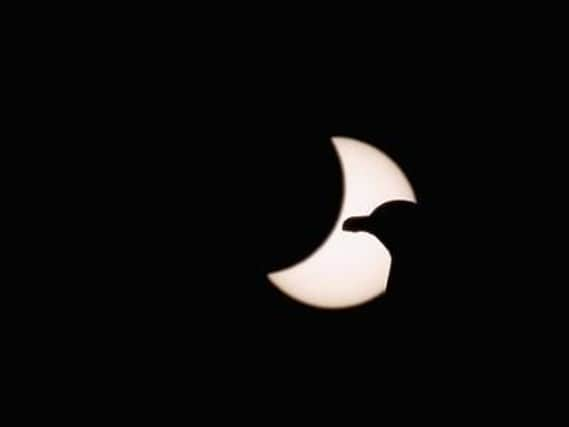What time is the solar eclipse on June 10 2021? And will we get a 'ring of fire'?


We won't be thrown into complete darkness, some areas will see almost a third of the Sun's light blocked by the Moon
It will start at 10.07am BST tomorrow, Thursday, June 10, reaching its maximum at 11.14am and will finish at 12.26pm.
Why does a solar eclipse happen?
Advertisement
Hide AdAdvertisement
Hide AdWhen the Moon comes between the Sun and Earth. The kind of solar eclipse depends on where the the Moon is as it doesn't travel around Earth in a perfect circle. When the Moon is at its closes point to Earth, it can block out most of the Sun's rays, causing a total eclipse.
If the moon, however, is aligned with the Sun when it's near to its furthest point from Earth, all of the Sun's light won't be blocked, instead leaving a red ring, creating an annular eclipse.
Although we won’t be able to see an annular eclipse, we will be able to see a partial eclipse, due to the UK not being exactly aligned with the Moon and the Sun. We'll will instead be covered by the Moon’s ‘outer shadow’ or penumbra.
Why is it dangerous to look directly at the solar eclipse
It's always dangerous to look directly into the Sun. Doing so allows ultraviolet light to flood your retinas, which can permanently damage your vision.
Advertisement
Hide AdAdvertisement
Hide AdDr Chien Wong, consultant retinal surgeon at OCL Vision, said: “Solar eclipses can be a breathtaking spectacle. But if you’re not careful, viewing them can put your eyes at serious risk.
“Viewing the sun directly, even momentarily, can cause irreversible damage to your eyes - particularly your fine central vision. The delicate retina cells can be damaged by the sun’s rays, which remain powerful even during an eclipse.
“There is no treatment for this kind of damage, and clearly no spectacle is worth permanently harming your vision.
“Wearing sunglasses will provide only limited protection if you look at the sun directly. The safest way to view an eclipse is indirectly - for example by making a pinhole camera out of cardboard.
Advertisement
Hide AdAdvertisement
Hide Ad“Dedicated solar eclipse glasses and filters can be used, but even they should be worn with caution, as the sun is still capable of breaking through this technology.
“While nothing beats seeing the cosmic beauty of the stars with your own eyes, when it comes to viewing a solar eclipse, it’s much safer to consider watching it on your TV.”